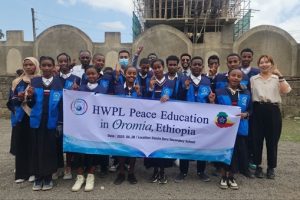
The fourth round of filling of the Grand Ethiopian Renaissance Dam (GERD) or Abbay Dam has been hailed as a success, despite facing diplomatic pressures, according to Yacob Arsano, a member of the GERD negotiating team.
Similarly, Prime Minister Abiy Ahmed (PhD) announced the achievement of the fourth-round filling, highlighting the immense challenges Ethiopia had to overcome. The successful completion of this phase has not only reversed the pressure against Ethiopia but also secured a significant diplomatic victory for the country.
Yacob Arsano, who is also a Hydro Politics Researcher at Addis Ababa University, emphasized that the Ethiopian people prioritize their national interest and the well-being of future generations over personal interests. The Abbay Dam, funded and built by the Ethiopian public, is a testament to their commitment.
Yacob Arsano stated that the dam’s filling is a result of the collective contribution of the public in terms of financing, labor, knowledge, and prayers.
Ethiopia has always taken into consideration the mutual benefits of neighboring downstream countries in its water development projects. The filling of the dam has been carried out while ensuring sufficient water flow to the downstream countries.
Yacob further highlighted that Ethiopian officials have confirmed that the Aswan Dam in Egypt is holding sufficient water. This demonstrates Ethiopia’s commitment to utilizing trans boundary water resources fairly and without causing significant harm to downstream countries.
The Ministry of Water and Energy (MoWE) recognizes the progress in the construction of the Abbay Dam as a symbol of mutual growth in the Horn of Africa. Minister Water and Energy, Habtamu Itefa emphasized that the dam, financed by Ethiopia, aims to benefit all stakeholders and integrate the region.
Ethiopia has already been providing renewable energy to Sudan, Kenya, and Djibouti at an affordable price, and there are plans to export power to South Sudan too. The interconnectedness facilitated by Ethiopia’s green energy sources, including the Abbay Dam, strengthens regional cooperation.
The Abbay Dam project not only contributes to Ethiopia’s energy security but also opens up opportunities for economic growth. Minister Habtamu highlighted that the artificial lake created by the dam could serve as a source of income through fishing and recreation services.
Additionally, the industrialization driven by the dam’s power generation capacity can attract investments and address the pressing issue of youth unemployment.
In line with Ethiopia’s focus on renewable energy development, the Geothermal Sector Development Project Department of Ethiopian Electric Power announced a significant milestone. The Aluto Langano underground steam project has successfully produced 25 megawatts of power from the production test. The project involves drilling steam generation wells and utilizing geothermal energy. The completion of the additional wells in the project is expected to further increase power generation capacity. The project, supported by the World Bank, aims to generate 70 megawatts of power and create both permanent and temporary job opportunities for Ethiopians.
Ethiopia possesses abundant natural resources and favorable geographical conditions that make it highly suitable for harnessing renewable energy sources. As the country strives to meet its growing energy demands while reducing its carbon footprint, it is crucial to effectively exploit and utilize renewable energy resources. This comprehensive guide aims to provide a roadmap for fully exploiting and utilizing renewable energy projects in Ethiopia.
The first step is to conduct a thorough assessment of Ethiopia’s renewable energy resources. Solar, wind, hydroelectric, geothermal, and biomass energy sources should be identified and evaluated across the country. This assessment will help prioritize the most viable options for exploitation and utilization.
Developing a robust policy framework is essential to support renewable energy development. This includes setting renewable energy targets, providing incentives for investors, and establishing favorable regulatory environments. Clear guidelines for project development, grid integration, and power purchase agreements will attract private investments and accelerate the deployment of renewable energy.
Partnerships between the government, private sector, and international organizations play a crucial role in fostering renewable energy growth. Collaborations can drive innovation, technology transfer, and financial support for renewable energy projects. It is important to engage local communities in the planning and implementation processes to ensure inclusivity and maximize social acceptance.
Modernizing and expanding the existing grid infrastructure is necessary to accommodate the integration of renewable energy. Enhancing transmission and distribution systems, implementing smart grid technologies, and establishing energy storage facilities will enable the effective management of intermittent generation from renewable sources. Strengthening the grid will facilitate efficient power delivery and reduce transmission losses.
Ethiopia’s solar potential should be leveraged through the implementation of large-scale solar projects. Encouraging the adoption of solar photovoltaic systems for residential, commercial, and industrial applications is essential. Incentives such as net metering and tax benefits should be provided to promote decentralized solar installations. Solar parks and mini-grids can be developed to power remote areas and support rural electrification.
Identifying favorable wind corridors and establishing wind farms with significant electricity generation capacity is another important step. Detailed wind resource assessments should be conducted, and private investment in wind power projects should be encouraged. The integration of wind power into the grid should be carefully planned to ensure stability and reliability.
Hydroelectric power has been a traditional source of energy in Ethiopia, and there is still untapped potential for further development. The construction of large dams, such as the Abbay Dam, should continue to be pursued to harness the power of rivers effectively. Small-scale hydropower projects can also be implemented in rural areas to provide electricity to local communities.
Ethiopia’s geothermal resources have significant potential for power generation. Conducting detailed geothermal resource assessments and drilling exploration wells will help identify suitable sites for geothermal power plants. Public-private partnerships can be formed to attract investment and expertise in geothermal development.
Biomass energy, derived from agricultural waste and forest resources, can be utilized for both electricity generation and cooking purposes. Promoting the use of efficient biomass cook stoves can reduce deforestation and indoor air pollution. Biomass power plants can also be established to convert organic waste into electricity and heat.
To ensure the sustainability of renewable energy projects, capacity building and skills development programs should be implemented. Training local technicians and engineers in the operation and maintenance of renewable energy systems will create job opportunities and enhance the sector’s expertise.
In conclusion, Ethiopia has immense potential to exploit and utilize renewable energy resources. By conducting resource assessments, establishing a supportive policy framework, fostering partnerships, modernizing the grid infrastructure, and promoting different renewable energy sources, Ethiopia can achieve its energy goals while contributing to global efforts in combating climate change. The successful implementation of renewable energy projects will not only provide clean and affordable electricity but also drive economic growth and improve the livelihoods of the Ethiopian people.
Water politics and diplomacy refer to the complex interactions and negotiations between countries over shared water resources. As water scarcity becomes an increasingly pressing global issue, the management, allocation, and utilization of water resources often give rise to diplomatic challenges and conflicts. We can cite that some important rationales about the utilization of water.
Most of all, many rivers, lakes, and aquifers span multiple countries, necessitating cooperation and diplomacy to effectively manage these shared water resources. The diplomatic engagements surrounding trans boundary water resources involve negotiations, agreements, and institutions to ensure equitable and sustainable water allocation.
Water is a vital resource for human survival, agriculture, industry, and ecosystem health. Disputes often arise when countries perceive their access to water as inadequate or when they believe their water rights are being infringed upon. Negotiations and diplomacy are necessary to address issues of equity, ensuring fair access to water for all stakeholders.
Water can have significant geopolitical implications, especially in regions where water scarcity or disputes over water resources intersect with existing political tensions. Water-related conflicts can exacerbate existing political disputes and create additional challenges for diplomatic resolutions.
International water law, including customary law and specific agreements, provides a framework for resolving water-related disputes and promoting cooperation. Treaties and conventions, such as the United Nations Watercourses Convention, establish principles and guidelines for the equitable and reasonable use of trans boundary water resources.
Diplomatic efforts often involve mediation and conflict resolution mechanisms to address water-related disputes. International organizations, such as the United Nations and its agencies, as well as regional bodies, play a crucial role in facilitating negotiations, providing technical expertise, and mediating conflicts over water resources.
Hydro-diplomacy refers to the use of diplomatic means to foster cooperation and prevent conflicts related to water resources. It emphasizes the importance of dialogue, trust-building, and shared benefits in managing trans boundary water resources effectively. Hydro-diplomacy aims to shift the focus from a zero-sum game to mutually beneficial outcomes.
Access to reliable and comprehensive data on water resources is crucial for effective water management and decision-making. Diplomatic efforts often include agreements and mechanisms for data sharing, joint monitoring, and cooperation in water-related research and assessment.
The impacts of climate change, such as changing rainfall patterns and increased water stress, further complicate water diplomacy. Adapting to these changes and developing sustainable water management strategies require international cooperation, technological innovation, and diplomatic efforts to address the challenges posed by climate change.
Overall, water politics and diplomacy are essential for promoting cooperation, preventing conflicts, and ensuring the sustainable and equitable management of shared water resources. Effective water diplomacy involves dialogue, negotiation, and consensus-building among stakeholders at local, national, regional, and international levels.
BY LAKACHEW ATINAFU
Editor’s Note: The views entertained in this article do not necessarily reflect the stance of The Ethiopian Herald
THE ETHIOPIAN HERALD WEDNESDAY 20 SEPTEMBER 2023



